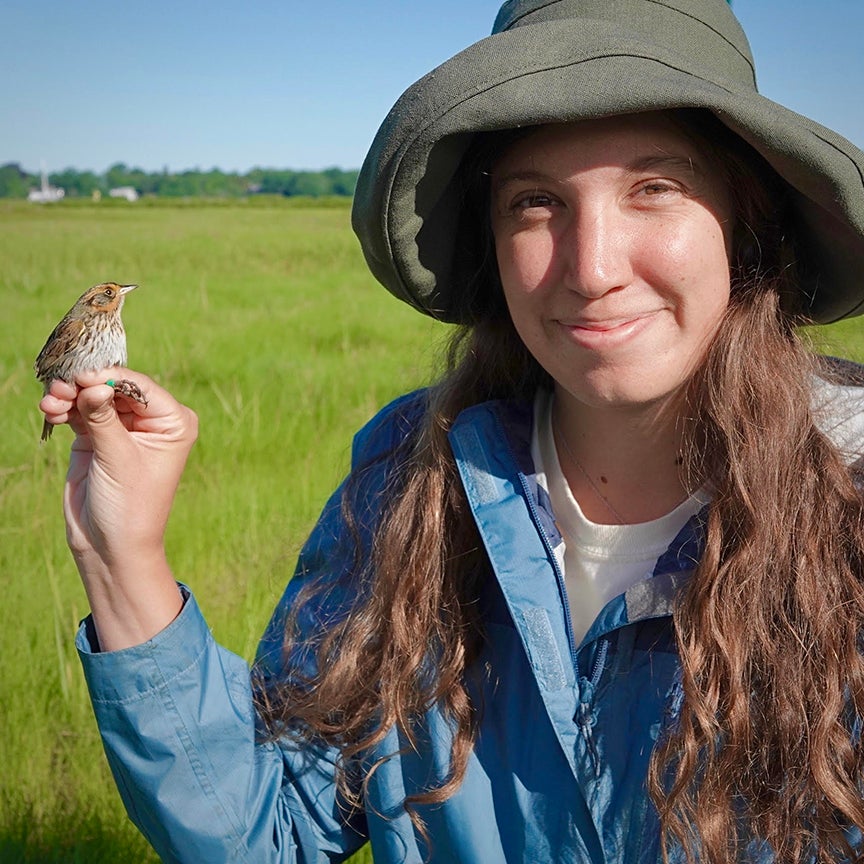URI student studies rare bird on verge of extinction
 |
| URI student Jessica Szpila poses with a rare saltmarsh sparrow at Jacob’s Point in Warren. (Photo courtesy of Jessica Szpila) |
Even though the rare saltmarsh sparrow is expected to go extinct by 2050 due to rising sea levels flooding its nesting habitat, University of Rhode Island junior Jessica Szpila is committed to doing what she can to learn about the birds in hopes of discovering something about them that might delay their disappearance.
Szpila, 26, a native of Tiverton who lives in Providence with her husband, stepdaughter and young son, spent the summer collaborating on the Saltmarsh Sparrow Research Initiative at Jacob’s Point in Warren, led by amateur ornithologists Steven Reinert and Deirdre Robinson.
Together, they are documenting the nesting
success of the sparrows at the marsh.
“Our goal is to collect as much data as we can and get as deep an understanding of this bird as possible,” she said. “It’s a small endangered songbird that only lives on the East Coast, and its population is decreasing at about 9 percent annually.”
She spent most days looking for nests, monitoring the eggs to see if they
hatch, banding the adult birds and nestlings, assessing the vegetation where
they build their nests, and documenting if the chicks survive.
“We’re studying their nesting ecology,” Szpila said. “Mainly, we’re looking at
the variables to nesting success or failure in the marsh.”
Because so many chicks die in their nests during high tides, it can be an
emotionally challenging job.
“I definitely learned that working with an endangered species is intense,” she
said. “In some ways, you have to have a strong heart to be able to cope with
seeing a lot of death and sadness, and understanding that this species is
likely to still go extinct despite our work.
“You also have to be strong to want to put in all this
work,” Szpila added. “My mentors are inspiring, they care so much about this
species, and they’re doing everything they can to help the birds in any way
they can. I’ve fed off of that. Being in that environment has lifted me up.”
Despite the challenges, she has enjoyed her first field
research experience.
“Being on the salt marsh every morning was quite beautiful,”
Szpila said. “And there were lots of other beautiful birds out there. It was an
amazing opportunity to learn to collect large bodies of data in the field and
analyze them at home on the computer. I learned so much about working with a
small team on a big project, which meant that I had a lot more responsibility
than ever before.”
Szpila’s research was supported by the URI Coastal Fellows
Program, a unique initiative designed to involve undergraduate students in
addressing current environmental problems. Now in its 25th year, the program
pairs students with a mentor and research staff to help them gain skills
relevant to their academic major and future occupations.
As she completes her Coastal Fellows research project this
fall, Szpila is already looking ahead to next year, when she will pursue a
senior thesis project on the saltmarsh sparrows and whether the females choose
a nesting location higher in the marsh after seeing their first nest become
flooded. Eventually she plans to earn a doctorate to continue studying birds.
“I really enjoy teaching — I’ve done a lot of tutoring — so
I’d like to keep doing that,” she said of her career plans. “And I want to stay
in academia because I’d have a lot of access for continuing research in the
field.”